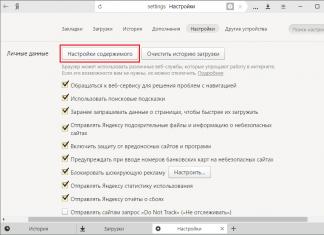The discussion of new forms of state regulation of the Internet in the Russian Federation (with subsequent legislative reinforcement) has been on stream over the past couple of years. Each such regulatory impact is almost always met negatively by Internet market participants themselves. The fundamental nature of this fear was explained to Vladimir Putin at the “Internet Entrepreneurship in the Russian Federation” forum DMitriy Grishin, Chairman of the Board of Directors and General Director of Mail.Ru Group (hereinafter quotes from the website of the President of the Russian Federation):
“[...] The Internet has developed over the past 15 years in an open environment. We have competed and are competing with very powerful Western companies that are orders of magnitude ahead of us in terms of financial and human resources, and in principle we are doing this successfully. And during this time we have developed a certain mentality of competition, openness, we rely on ourselves, and it is quite deep, this mentality. And that is why, in principle, any regulation, internal, due to the fact that we grew up in this environment, it causes some rejection. There is, one might say, a prejudice that any contact with the authorities, in general, will not lead to anything good.”
At the same time, Mr. recognized the inevitability of this regulation, noting that Runet has grown and become an integral part of society; that Russian Internet users are not “frostbitten”, they love their country, they want it to be comfortable to live and work here, and that it is also comfortable to exist on the Internet. But the head of Mail.Ru Group has doubts about the implementation of government regulation measures on the Internet:
“[...] Very often the ideas contained in regulation are very correct. But, unfortunately, sometimes it happens that implementation, in general, is scary. And I would really like to develop, perhaps, some kind of systematic process that would allow us not only to listen, but also to be heard, and for us to actually see that there is feedback that can be implemented.”
With this argument Vladimir Putin in fact, he agreed, clarifying that “you still can’t hide from us (that is, the state - editor’s note)” and it would be better for Internet users to “get out from under the snags” and enter into dialogue with the authorities. The President stated that regulatory measures should not limit fundamental freedoms:
“[...] Zprohibitions - for everything and everyone there is one thing: “grab and don’t let go” - this is a well-known rule, but it does not lead to anything good. […] We have discussed a lot about the restrictions that have been introduced related to pedophilia, the promotion of drugs, terrorism or the promotion of suicide. Listen, we are all adults, why do we need this with you? Let's take pity on our children. But another thing is that under this brand, under this roof, no restrictions can be introduced related to the freedoms of man and citizen, which are number one in our Constitution, and nothing can be introduced that would be contrary to the interests of the free market, meaning great business volumes."
Vladimir Putin assured the heads of the largest Internet companies in the Russian Federation that “the state, from which you would like to hide, has no interest in acting in the interests of one part of society and to the detriment of another. On the contrary, we want to build relations in such a way that they are harmonious,” and the state will help Runet leaders capture markets in other countries.
The ex-co-chairman of the RPR-Parnas party sees another catch in the president’s appeasing statements:
“From my point of view, this meeting (of the president and leaders of the Internet industry - editor's note) does not bode well. […] Because most often what happens is exactly the opposite of what is said publicly. […] I just think that this meeting is preparing troubles for the Russian Internet, for the RuNet, and these troubles are already in full swing. I would like to remind you that exactly a year ago a law was passed that for the first time allowed officials to block websites without a court decision. There are already a lot of precedents when specific sites are blocked by a decision of Roskomnadzor. […]CNowadays, security services require providers or popular social networks to have access to users’ personal data. They require access to IP addresses, including logins, access to information about all transactions, that is: what a person reads, where he goes, with whom he corresponds, and so on. True, so far it seems that we are not talking about the very content of emails or chats, which we all use on Facebook and so on. But who knows?".
Mr. Ryzhkov is convinced that the authorities are waging a full-scale attack on the Internet, control over the Internet will be tightened, and the dialogue at the “Internet Entrepreneurship in the Russian Federation” forum “will even accelerate the degree of movement towards this control.”
The editor-in-chief of Echo of Moscow participated in the development of proposals to the President of the Russian Federation on behalf of the Internet business. In his opinion, given on the radio station’s website, “chaotic disorderly lawmaking” in the sphere of regulating citizens’ online activity harms Internet business as such:
“[...] It was very important to convey to the president that those laws that are adopted against freedom on the Internet are adopted against freedom on the Internet, so that there is no doubt. They hit this business, push sites to other sites, we know about the massive departure of investors, the outflow of investors from the Internet business after the adoption of all sorts of strange laws that are difficult to implement, unimplementable, and, accordingly, selective.”
The editor-in-chief of Echo of Moscow doubts the effectiveness of the meeting with the president and predicts that “the attack on the Internet will not be stopped”:
“[...] The president already has an established point of view. […] I don’t know how this will all end. But the president says all the right words, but he said the right words before. But this attack on the Internet, of course, will not be stopped by this meeting. Maybe in some zones it will be possible to stop the zealous officials who always run ahead and not only the officials who always run ahead of the locomotive shouting “let’s do not 21, but 22.”
The general director of Yandex spoke about the importance of maintaining free competition in the Internet business at a meeting with the president. He emphasized that Russia is one of the few countries with a predominant share of its own key Internet products, and protectionism and state support for conquering the markets of other countries, which Vladimir Putin spoke about, are not required for a free, unregulated market:
«[…] Russia is one of the few Internet markets that is dominated by its own Internet services in almost all areas. And this dominance was achieved not due to some kind of patronage, but due to the fact that the industry was simply allowed to develop on its own, to live and work in a competitive environment. This is such a rare example when, without any protection, unlike other markets, we have our own strong players. And now a new stage is beginning, almost all of our leading companies, and startups too, have gone abroad with these technologies to other markets, because they have grown in competition.”
It became known that the FSB decided to ban foreign high-speed satellite Internet projects in Russia for reasons of national security.
According to the site, FSB representative Vladimir Sadovnikov commented on various foreign projects of the global satellite Internet at a recent conference in Moscow, in particular, the British OneWeb project. Sadovnikov expressed fears that “such a global satellite communication system could be of an intelligence nature and pose a great threat to citizens of the Russian Federation.” Since the country’s authorities cannot guarantee the security of such a system in any way, they plan to seriously limit Russians’ access to it, or even completely ban it. Instead, it is planned to introduce similar domestic projects.


Another problem with such foreign projects in Russia, according to Sadovnikov, is the threat of competition for the market of Russian telecom operators. So, if the British OneWeb project becomes an active player in the Russian market, then it can monopolize access to communication services, and as a result, make Russian regions strictly dependent on foreign providers.
Therefore, Russia wants to rely on its own global communications systems, such as the Sphere projects jointly with Roscosmos and the Messenger. The domestic project “Sphere” is planned to be launched by 2025, and more than 600 small communication satellites will be launched into orbit.
Interestingly, the OneWeb project is just one of several planned global satellite Internet projects, which are planned to be implemented as early as 2019. Previously, the site wrote about a similar project by entrepreneur Elon Musk called Starlink, which is scheduled to begin work in 2020.
In Russia, they propose to ban anonymizers and VPNs – programs that allow you to bypass website blocking. The corresponding bill was registered in the State Duma. The authors of the document believe that the Russian blocking system is “not effective enough” in preventing the spread of prohibited information and extremist materials.
Is it possible to ban anonymizers and what will this mean for Russians? About this on air Radio Crimea.Realities says the director of the Russian analytical agency “Tochka Otscheta” Mikhail Klimarev and cybersecurity specialist Nikita Knysh.
– Mikhail, how realistic is it to ban anonymizers from a technical point of view?
Klimarev: I find it difficult to say, because technically it is impossible to ban it. Any Internet resource can be an anonymizer: that’s how it’s designed, that’s how it was developed. Banning an anonymizer means banning the entire Internet.
– That is, from a technical point of view, that bill was poorly developed or is it simply illiterate?
Banning an anonymizer means banning the entire Internet
Mikhail Klimarev
Klimarev: He is completely illiterate. I'll try to explain. Each computer, in order to transmit information to the Internet, is provided with a special number called an IP address. Computers send information from one address to another. But before it gets there, it goes through a chain of other computers: routers, switches and others. In theory, each computer can address data transfer to any other computer on the network. And in order not to describe the entire path of information transfer, there is the technology of virtual private networks - VPN. He simply prescribes a ready-made path. And so that information is not lost or distorted, it is wrapped in special containers, encrypted and thus transmitted. If you think you don't use a VPN, you don't. Typically, when you enter your username and password to go online, you are already connected to your provider's virtual private network. Therefore, it turns out that if VPN is banned, then access to the Internet will be banned altogether.
– So this is a reality to which it is impossible to adapt?
Klimarev: I tried to read the bill. It is written in such terrible Russian that it is impossible to understand what is written there. He is so illiterate that he can be interpreted in any way. You can close this kind of access and say that everyone should have only white IP addresses. But then the cost of connecting to the Internet will increase. All the terminology is confused there, for some reason search engines are tied there, which should not provide information so that you can read how this technology works. Banning reading about basic Internet technologies - yes, it’s the same as banning the Internet in Russia.
– Are there more or less effective ways to control the network? Maybe some technologies were perfected in other countries? Like the Great Firewall of China?
Klimarev: There is more talk about the Great Firewall of China than it actually works. I communicate quite calmly on Facebook with Chinese partners and friends - although Facebook is considered completely blocked in China. The same goes for Skype. You need to understand that in China there are only four or five providers that are allowed limited data transfer. But even there they cannot block everything.
In principle, no one can control the Internet, no matter how much they want it
Mikhail Klimarev
You also need to understand that the Internet was created by the military precisely for the purpose of being able to transfer data in the face of some kind of opposition. And over 50 years, the protocols have developed in such a way that, in principle, no one can control the Internet, no matter how much they want to. Or it is necessary, as in North Korea, to disconnect from all external channels and control it in this way.
– Nikita, the situation with the bill looks as if in Russia they want to ban the Internet altogether.
Knysh: A number of cyber experts in Ukraine, after the president signed a decree on blocking social networks, argued that blocking would require a billion dollars and years to implement. But, as we see, this was implemented in two or three days - very quickly and very successfully. In this regard, I can say one thing: if there is a desire. There are nuances to VPNs. Now the Internet is controlled by two or three large backbone providers, and blocking VPN services and TOR services in Russia is not difficult. Blocking there works on the principle of the so-called blacklist, that is, unwanted resources are simply added there by decision of Roskomnadzor, and they stop appearing on the territory of the Russian Federation. What’s stopping them from adding popular Nod addresses to the list? In my opinion, nothing. This will significantly slow down TOR in Russia, and it will simply become inconvenient for the user to use it. Therefore, it seems to me that the Russians will be able to block it. Whether it will be effective or not is another question. It is clear that people associated with IT and programming will be able to easily bypass this. But for ordinary people it will be more difficult.
– How much will VPN bans increase the cost of Internet services? Or will the Russian Internet community resemble a car driving at high speed in first gear?
Knysh: This is exactly what it will look like. Firstly, in Russia the Internet and cellular communications are already several times more expensive than in Ukraine. This is precisely because of the “burden” of the state, because providers must log a huge amount of data. The so-called “Yarovaya law” will also increase the cost if it is implemented. Sometimes it even gets to the point of absurdity, when you have to register with your passport in order to access the Internet in a public place.
– How justified is this measure from a security point of view?
Knysh: Absolutely not justified. As you can see, this does not interfere with terrorism. If a person wants to do something bad, he can find a way. Before this, they wanted to ban Telegram Messenger because terrorists communicate there. This is completely absurd. I think this is more aimed at restraining politically dissatisfied people and protest sentiments in Russia.
Another question - in our case (in Ukraine – KR). The fact that we blocked VKontakte, Odnoklassniki and Yandex is an effective counteraction to the aggressor in wartime. In my opinion, these are acceptable measures. After all, it’s not difficult for people to install a VPN and ways to bypass restrictions. It's great they're allowed to do it. But Ukraine made sure that Russian intelligence services did not see the location of the users. That is, the VPN hides us.
– Are there any ways in the world that allow you to control the Internet?
Knysh: Eat. I do not agree with my colleague that bans can be successfully circumvented in China. I have friends who work at Google and Microsoft. If they go on a business trip to China, they are given a special satellite Internet device or a device that already contains modified routing through Chinese servers. This allows you to automatically bypass this Great Firewall of China. Moreover, a number of applications that are successfully used in the European Union and the United States are generally prohibited in China. Therefore, foreign corporations that send their employees there provide them with the necessary instructions on how to legally circumvent the restrictions. But in China, everyone still has problems with access to familiar Internet resources. So the Great Firewall of China is one of the most successful examples of the state protecting internal networks from external intrusion.
– Even the experience of blocking VKontakte and Odnoklassniki on the territory of Ukraine shows that people always have the opportunity to bypass blocking. It turns out that, theoretically, bans can be circumvented, but in practice, the behavior pattern for users will change after any ban, isn’t it?
Knysh: Of course it will change. There was a lot of talk after the decree was signed by the president about how this was an attack on freedom of speech, a restriction of constitutional rights, and so on. But the state has the right to covert investigative actions, that is, wiretapping. For some reason, we do not believe that this is a violation of our constitutional right to privacy of personal correspondence or conversation. We are at war, and the state is forced to take certain measures in a certain situation. I think that when the war is over, the blockade will be lifted. But people won’t want to go back there anymore.
(Katerina Kovalenko worked on the text version of the material)
The introduction of the bill, known as the “Yarovaya package,” gave rise to many discussions on this topic on the Internet. Some time ago, before this, a law was introduced that made it possible to introduce bans on certain sites by adding them to the register of prohibited sites. As you follow this news, you might get the impression that all this could lead to the fact that soon the Internet will be issued by coupons, and only a few sites from the white list will be available. Let's consider such perspectives.
Website ban.
As we can see, the registry of banned sites is a very undeveloped idea. Firstly, blocking the site by IP. There have already been several contenders when, along with the blocked site, several other sites are blocked at once. Apparently, the creators of the bill did not realize that one IP can host a web server that serves several sites, that there is such a service as virtual hosting, and that the person who hosted the site has no idea what sites are running on the same machine with his site, and who are the people who own them. They were also not aware that dedicated IP is a service that is not provided by all hosting providers and for a separate fee. In addition, this ban can be easily circumvented by getting a different IP and changing the entries in the NS servers. After a few hours, the site will automatically become available and its daily visitor can access it quite transparently, without noticing that the site he is visiting has been blocked. The worst thing is that such a stupid blocking, which can easily be bypassed by the owner of a blocked site, but which a flower girl from Kryzhevsk who decided to keep her own blog, which was blocked in one go, is unlikely to cope on her own, takes dozens of man-hours from prosecutors and judges. Now we have already learned how to filter traffic that belongs to a certain domain, but this took some time and money from providers to purchase equipment that can actually filter application-level protocol traffic, and this is a rather serious technique and not available from all providers. Wouldn't it be possible, if we were to introduce a law allowing this to be done, then at least think it through? At least introduce the ability to block on the hosting side as a tool? However, we get what we get and Roskomnadzor continues to please us by throwing one news feed after another and one gets the feeling that the law was really drafted by people who are fans of films about hackers of the 90s and think the phrase “yes, I’ll figure you out on IP Uasya!” is cool.
Traffic recording
It would seem that it was blocked by IP. How could such technical illiteracy be squared? But apparently, after the introduction of the “Yarovaya package” we once again had to make sure that nothing is impossible. At least in the legislative aspect. Look, if we assume that the average Internet user has a volume of everything downloaded and transferred per year that is 10 times greater than what is on his hard drive, then it is not difficult to conclude that in order to record the volume of transferred data, it is necessary at least 5 times more disks in volume than the population, or 10 if we are going to write, both near the receiver and near the transmitter. But, apparently, such a simple conclusion did not occur to the one who proposed such an idea.
An even greater technical difficulty is intercepting a bunch of types of traffic, in addition to HTTP downloads. It's trite how to capture a random stream of UDP datagrams in real time without delaying them along the way, while writing them in real time to disk, before the memory buffer overflows and the datagrams are lost forever. How to listen to traffic in a P2P network, where each intermediary between the source and the receiver may not have complete information and communicate with each other using the UDP protocol, seems to me to be a much more non-trivial task. But without solving these problems, you won’t even be able to record a banal torrent download. What can we say about the transmission of traffic of a network multiplayer game, where the banal loss of packets through your fault can interrupt the game. Therefore, I think this law will not be fully implemented, because it simply cannot be implemented.
But they are going to get the encryption keys. With such an intrusive and demonstrative attempt, don’t you think that people will not use means of anonymizing traffic and encrypting their correspondence? They will. And they will use TOR, and telegram, and generate their own encryption keys without obtaining a license for this, because the Internet is built on these principles. Therefore, it is necessary to observe the limits of reason everywhere. In this case, it is not an attempt at total surveillance of everyone (I hope there is no need to explain why this idea is not only not feasible, but also undermines trust in the authorities), but of people who really pose a threat.
Great Firewall of China?
One example of Internet control is China's isolated Internet. In China, foreign services like Google Play, Maps and YouTube do not work. Not that this greatly limits the native Chinese, for whom these services are not intended, but it is less convenient for the Russian-speaking population there. We are not China and the consequences of such a prospect, if realized, will be more noticeable for us. And we will bypass these restrictions, just like in China, by organizing underground communication channels through VPNs and proxy servers. And we will have the same Internet as now, only worse. Is this what you want (appeal to legislators)? Okay, but RuNet will also suffer. I'm sure there are a considerable number of sites in the RU domain that are hosted abroad. In addition, we will be forced, like the Chinese, to steal Internet technologies from the same part of the Internet that we ourselves prohibit. Please don't let it come to this.
Conclusion
As a conclusion, I would like to end on an optimistic note, regarding the fact that even if they accept such game, after a while they themselves realize that this is a mess and make amendments or simply poorly implement impossible laws and therefore it is hardly worth the wait such extreme extremes.


























